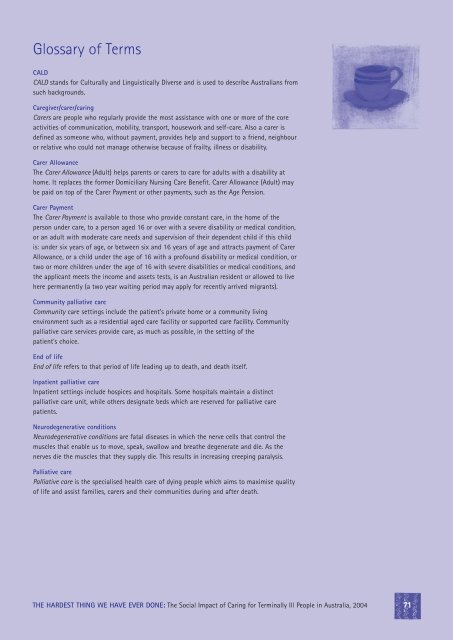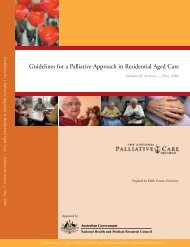The hardest thing we have ever done - Palliative Care Australia
The hardest thing we have ever done - Palliative Care Australia
The hardest thing we have ever done - Palliative Care Australia
Create successful ePaper yourself
Turn your PDF publications into a flip-book with our unique Google optimized e-Paper software.
Glossary of Terms<br />
CALD<br />
CALD stands for Culturally and Linguistically Diverse and is used to describe <strong>Australia</strong>ns from<br />
such backgrounds.<br />
<strong>Care</strong>giver/carer/caring<br />
<strong>Care</strong>rs are people who regularly provide the most assistance with one or more of the core<br />
activities of communication, mobility, transport, housework and self-care. Also a carer is<br />
defined as someone who, without payment, provides help and support to a friend, neighbour<br />
or relative who could not manage otherwise because of frailty, illness or disability.<br />
<strong>Care</strong>r Allowance<br />
<strong>The</strong> <strong>Care</strong>r Allowance (Adult) helps parents or carers to care for adults with a disability at<br />
home. It replaces the former Domiciliary Nursing <strong>Care</strong> Benefit. <strong>Care</strong>r Allowance (Adult) may<br />
be paid on top of the <strong>Care</strong>r Payment or other payments, such as the Age Pension.<br />
<strong>Care</strong>r Payment<br />
<strong>The</strong> <strong>Care</strong>r Payment is available to those who provide constant care, in the home of the<br />
person under care, to a person aged 16 or over with a s<strong>ever</strong>e disability or medical condition,<br />
or an adult with moderate care needs and supervision of their dependent child if this child<br />
is: under six years of age, or bet<strong>we</strong>en six and 16 years of age and attracts payment of <strong>Care</strong>r<br />
Allowance, or a child under the age of 16 with a profound disability or medical condition, or<br />
two or more children under the age of 16 with s<strong>ever</strong>e disabilities or medical conditions, and<br />
the applicant meets the income and assets tests, is an <strong>Australia</strong>n resident or allo<strong>we</strong>d to live<br />
here permanently (a two year waiting period may apply for recently arrived migrants).<br />
Community palliative care<br />
Community care settings include the patient’s private home or a community living<br />
environment such as a residential aged care facility or supported care facility. Community<br />
palliative care services provide care, as much as possible, in the setting of the<br />
patient’s choice.<br />
End of life<br />
End of life refers to that period of life leading up to death, and death itself.<br />
Inpatient palliative care<br />
Inpatient settings include hospices and hospitals. Some hospitals maintain a distinct<br />
palliative care unit, while others designate beds which are reserved for palliative care<br />
patients.<br />
Neurodegenerative conditions<br />
Neurodegenerative conditions are fatal diseases in which the nerve cells that control the<br />
muscles that enable us to move, speak, swallow and breathe degenerate and die. As the<br />
nerves die the muscles that they supply die. This results in increasing creeping paralysis.<br />
<strong>Palliative</strong> care<br />
<strong>Palliative</strong> care is the specialised health care of dying people which aims to maximise quality<br />
of life and assist families, carers and their communities during and after death.<br />
THE HARDEST THING WE HAVE EVER DONE: <strong>The</strong> Social Impact of Caring for Terminally Ill People in <strong>Australia</strong>, 2004<br />
71
















